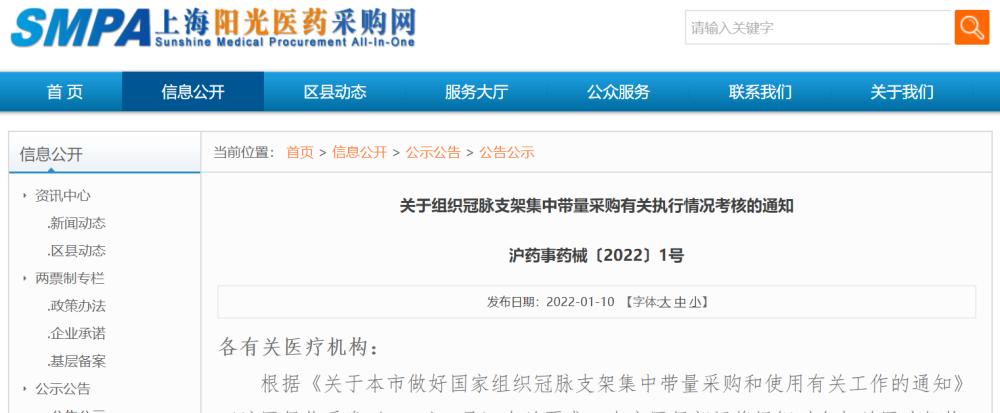(Health Times reporter Kong Tianjiao) "Implement the policy of retaining the balance of medical insurance funds, and give medical institutions incentives for balance retention in accordance with relevant regulations." Xu Zhimin, deputy chief physician of the Department of Cardiovascular Medicine of Xinhua Hospital affiliated to Shanghai Jiao Tong University School of Medicine, told the Health Times reporter that the feedback on the balance of medical insurance funds in the centralized procurement of drugs is the main supporting measure to promote the centralized procurement of drugs, which is of great significance to reduce the burden of medical treatment on the people, ensure the smooth operation of the medical insurance fund, and enhance the enthusiasm of medical institutions and medical personnel to participate in the reform of centralized drug procurement organized by the state and provinces.
On January 10, Shanghai Sunshine Pharmaceutical Procurement Network issued the "Notice on the Implementation Of the Implementation Assessment of the Centralized Procurement of Coronary Stents". The notice shows that the assessment object this time is the designated medical institutions in the city that participate in the centralized procurement of coronary stents organized by the state. The assessment method is that the Shanghai municipal medical insurance department organizes and implements the specific organization based on the procurement data of the sunshine procurement platform, and determines the proportion of the medical insurance fund balance retained by each medical institution according to the proportion of the balance retained by the centralized procurement of drugs organized by the state.

Screenshot of Shanghai Sunshine Pharmaceutical Procurement Network
That is to say, this assessment is related to the proportion of medical insurance fund balance retention in each hospital, and from the published documents, the total score of the national medical insurance balance retention assessment index of coronary stents is 100 points. Two of them have a veto effect.
"Now it is up to the state to come forward to negotiate reforms and bring down the price of the bracket in the right direction." However, if the supporting policies are not implemented, the effect is to be discounted, in the past, various consumables commissions were cancelled, and to ensure that the quality of medical treatment is not reduced, many intangible expenditures in clinical medical treatment cannot be implemented, and the enthusiasm of hospitals and medical staff in the long run will be affected to a certain extent, but now the surplus money is fed back to the clinic, which is also a feedback to the hospital and medical staff to withstand the pressure of reform, promote the reform of the salary system, reasonably improve the income of medical staff, and mobilize enthusiasm. Xu Zhimin mentioned that the assessment indicators pointed out that if the agreed purchase amount was not completed on time, the balance of the remaining funds would not be paid, and one vote would be rejected.
In addition, "whether to support and cooperate with the relevant reform measures of collection and procurement" can also be rejected by one vote. "If some places reduce it, but raise the fee in other links, this still does not reduce the cost, which is not in line with the original intention of the reform." Xu Zhimin told the Health Times reporter that the assessment indicators mentioned that medical institutions (main responsible persons) for the centralized procurement of medicines in the country and the city, in various forms of improper remarks or false information, causing serious adverse effects, after the medical insurance department verified, a vote vetoed, will not pay the balance of the remaining funds.
On November 5, 2020, the results of cardiac stent collection were opened in Tianjin, 10 products were selected, and the price of stents dropped from an average price of about 13,000 yuan to about 700 yuan, a drop of more than 90%, and the results of the collection were landed on January 1, 2021.
"The core idea of medical insurance fund management is sustainable development. Medical insurance funds do not collapse, the vast majority of patients can see the disease, enjoy the benefits brought by the amount of procurement, while the enthusiasm of hospitals and medical staff is guaranteed, the quality of medical efficiency is not reduced, so that medical insurance, the masses, the hospital 'three wins', is the original intention of the medical insurance with volume procurement policy setting. Xu Zhimin reminded that in this process, a regular quality supervision, assessment and feedback system for purchasing equipment, drugs and consumables should be established.
Attached: Coronary stent national collection of medical insurance balance retention assessment indicators